Thirteenth Amendment Sparks National Debate on Crime and Rights
Earlier, we told you about the government’s public consultation on the proposed Thirteenth Amendment Bill, and it’s a proposal that’s raising concern across the country. The Briceño administration says it’s a necessary move to restore order in communities plagued by crime. But critics argue it could open the door to serious human rights violations. The bill also proposes a new Gun and Gang Court and aims to retroactively legalize past States of Emergency, some of which were previously ruled unconstitutional. So, what does all this mean for your rights and your safety? In this edition of the Five-Point Breakdown, we’re unpacking the key takeaways from the Thirteenth Amendment and what it could mean for Belize’s future.
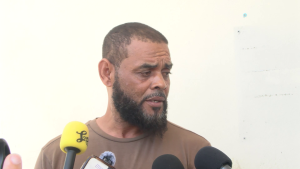
Kenneth “Big Tom” Flowers
Kenneth “Big Tom” Flowers, Belize City Resident
“These people in the community not even worry about these amendments. Some of them do or some of them don’t care. They don’t even know what it is. You understand? Till when time start knock on their door.”
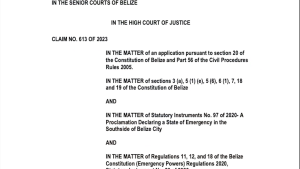 Britney Gordon, Reporting
Britney Gordon, Reporting
Earlier this year, a High Court ruling sent shockwaves across the country. Sixteen men who were detained during a 2020 State of Emergency were found to have been unlawfully imprisoned, and the government was ordered to pay them over three hundred thousand dollars in compensation. But here’s where it gets complicated. In a separate courtroom, another judge ruled that the government’s actions were legally justified. So, what now? Well, the current administration, though not the one that declared the SOE, is now footing the bill. And in response, they’ve introduced the Thirteenth Amendment Bill, a controversial proposal that would make all past states of emergency legally untouchable by the courts. So, what exactly is in this bill? And how could it reshape the balance between public safety and civil liberties? Attorney-at-law Darrell Bradley breaks it all down for us
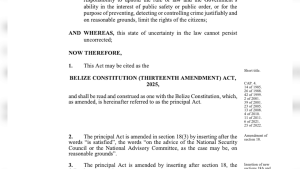 What is the 13th Amendment Bill?
What is the 13th Amendment Bill?
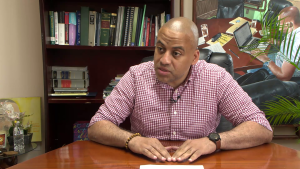
Darrell Bradley
Darrell Bradley, Attorney-at-Law
“The 13th Amendment seeks to address those things in. Three ways. Number one, it recognizes the declaration of special areas, so you can declare certain areas, special zones it can be areas which cover the entirety Belize, or it can be particular areas. And within these areas, the declaration will be made as a result of emergency situations as a, because of crime, the prevalence of crime. So it’s a crime. Fighting tool that you’re giving the government to deal with certain areas and within those areas, fundamental rights will be suspended during the period of the declaration.”
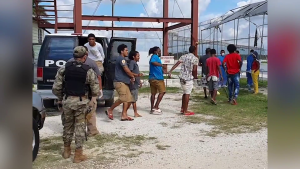 In these proposed “special areas,” police would be allowed to search, seize, and arrest people without a warrant. That’s raising red flags, especially in neighborhoods that have been repeatedly targeted under past states of emergency. While these tactics aren’t new, writing them into the Constitution would make them much harder to challenge in court. And that’s what has many people worried. One of them is Kenneth Flowers, better known as “Big Tom.” He says he’s been detained under every SOE for the past four years, and he’s concerned this new law could make it even easier for authorities to target people in his community without cause.
In these proposed “special areas,” police would be allowed to search, seize, and arrest people without a warrant. That’s raising red flags, especially in neighborhoods that have been repeatedly targeted under past states of emergency. While these tactics aren’t new, writing them into the Constitution would make them much harder to challenge in court. And that’s what has many people worried. One of them is Kenneth Flowers, better known as “Big Tom.” He says he’s been detained under every SOE for the past four years, and he’s concerned this new law could make it even easier for authorities to target people in his community without cause.
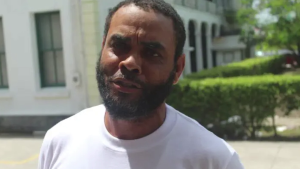
“Big Tom”
Who Will be Affected by the Bill?
Kenneth “Big Tom” Flowers, Belize City Resident
“I get victimized by my past. You understand? So that keep me go to jail whenever they have state of emergency, when I even committed a crime. So now I am against it because. A lot of children who are not involved in a crime and they children come on. So I think they should make better decisions because in a country like this, all of us are feeling government failing. Parents, feeling brother, sister feeling the churches are failing. So we should sit down and make better decision because crime have cons. But human have rights.”
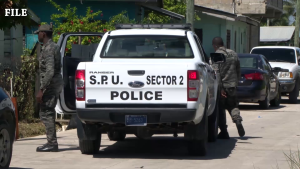 Assistant Solicitor General Randall Sheppard says the language of the proposed law will be revised before it’s finalized.
Assistant Solicitor General Randall Sheppard says the language of the proposed law will be revised before it’s finalized.
How is the Amendment Different from Current Legislation?
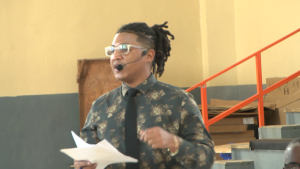
Randall Sheppard
Randall Sheppard, Asst. Solicitor General, Office of Attorney General
“Instead of having the order being issued as we, as I mentioned earlier, the order under the Crime Control and Criminal Justice Act is actually issued by the minister instead of allowing for that, the new provision in the Constitution that is being proposed at section 19 A. It states that the order would be done by the Governor General on the advice of the National Security Council.”
Under the proposed amendment, the power to declare “special areas” would shift from the minister to the Governor General, who must first consult with the National Security Council or the National Advisory Committee. This change is also meant to cover emergency declarations for natural disasters. These states of emergency would be limited to one month unless extended by a two-third vote in the House. But not everyone’s on board. Opposition Senator Sheena Pitts says the bill misses the mark, arguing it doesn’t address the root causes of crime.
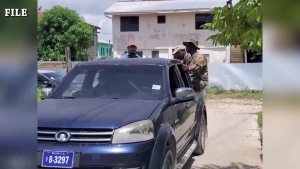 Is the 13th Amendment an Effective Solution to Crime?
Is the 13th Amendment an Effective Solution to Crime?
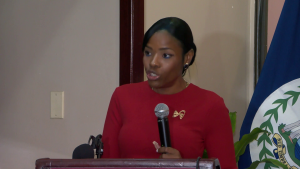
Sheena Pitts
Sheena Pitts, Opposition Senator
“ What the government is not doing is making the police department properly equipped with the capacity to solve crime. What the government is not doing is identifying areas in which they can strengthen. Crime fighting mechanisms. All they’re doing is taking the heavy handed approach, which is only temporary because a period of emergency is not forever. It is imposed in the first instance for a month, and so all they’re doing is putting a pause of what they feel would be a crime ridden area for one month limit people’s movements and their freedom.”
The People’s Constitution Commission recently wrapped up a full review of Belize’s Constitution, offering reform ideas based on public input. But attorney Darrell Bradley is raising concerns, not just about the bill itself, but about how it’s being pushed forward, despite that broader constitutional review.
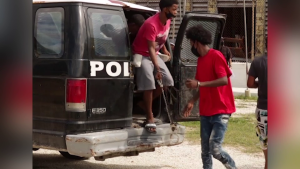 Darrell Bradley
Darrell Bradley
“Which quarters of society came up with this? So which quarters of society are clamoring for these kinds of changes? Are you talking about the law enforcement? Are you talking about the police? So again, how do we make laws in society? Do laws emerge organically from civil society agencies, from human rights agencies, from the legal fraternity? Or does the law emerge from the government? And the government comes up with a policy and then the government does consultations. You recently did an extensive public consultation that the people told you what they want to address, and then now we come up with something like this.”
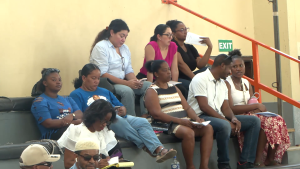 The bill is still in draft mode, and public consultations are playing a key role in shaping what happens next. While many Belizeans are still on the fence, or outright skeptical, the police department is all in. They’re backing the proposal, calling it a much-needed tool in the fight against crime. Britney Gordon for News Five.
The bill is still in draft mode, and public consultations are playing a key role in shaping what happens next. While many Belizeans are still on the fence, or outright skeptical, the police department is all in. They’re backing the proposal, calling it a much-needed tool in the fight against crime. Britney Gordon for News Five.





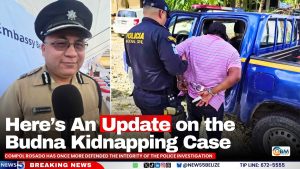
Facebook Comments